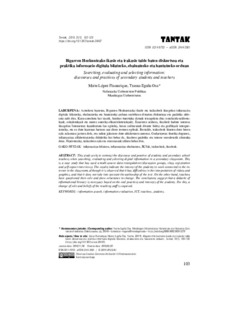| dc.rights.license | Attribution 4.0 International | * |
| dc.contributor.author | Egaña, Txema | |
| dc.contributor.other | López Flamarique, Maite | |
| dc.date.accessioned | 2020-06-23T14:49:09Z | |
| dc.date.available | 2020-06-23T14:49:09Z | |
| dc.date.issued | 2019 | |
| dc.identifier.issn | 0214-9753 | en |
| dc.identifier.issn | 2444-3581 | en |
| dc.identifier.other | https://katalogoa.mondragon.edu/janium-bin/janium_login_opac.pl?find&ficha_no=153450 | en |
| dc.identifier.uri | https://hdl.handle.net/20.500.11984/1696 | |
| dc.description.abstract | Azterketa honetan, Bigarren Hezkuntzako ikasle eta irakasleek ikasgelan informazio
digitala bilatzeko, ebaluatzeko eta hautatzeko orduan erabiltzen dituzten diskurtsoa eta praktika alderatu nahi dira. Kasu-azterketa bat izanik, hainbat iturritako datuak triangelatu dira (eztabaida-taldeetakoak, eskoletakoak eta aurrez aurreko elkarrizketetakoak). Emaitzen arabera, ikasleek badute interesa
ikasgelan Internetera konektatuta lan egiteko, baina zailtasunak dituzte bideo eta grafikoak interpretatzeko, eta ez dute kontuan hartzen nor diren testuen egileak. Bestalde, irakasleek ikusten dute beren
rola zalantzan jartzen dela, eta uzkur jokatzen dute aldaketaren aurrean. Ondorioetan ikusiko dugunez,
informazioa alfabetizatzeko didaktika bat behar da, ikasleen praktika eta interes errealetatik abiatuko
dena. Horretarako, irakasleen rola eta sinesmenak aldatu behar dira | eu |
| dc.description.abstract | This study seeks to contrast the discourse and practice of students and secondary school
teachers when searching, evaluating and selecting digital information in a secondary classroom. This
is a case study that has used a multi-source data triangulation (discussion groups, class registration
and self-report interviews). The results indicate the interest of the students to work connected to the internet in the classroom, although it is observed that it has difficulties in the interpretation of videos and
graphics, and that it does not take into account the authorship of the text. On the other hand, teachers
have questioned their role and show reluctance to change. The conclusions suggest that a didactic of
informational literacy is necessary based on the real practices and interests of the students. For this, a
change of role and beliefs of the teaching staff is required. | en |
| dc.language.iso | eus | en |
| dc.publisher | Universidad del País Vasco = Euskal Herriko Unibertsitatea | en |
| dc.rights | © 2019 UPV/EHU | en |
| dc.rights.uri | http://creativecommons.org/licenses/by/4.0/ | * |
| dc.subject | Informazioa bilatzea | eu |
| dc.subject | Informazioa ebaluatzea | eu |
| dc.subject | IKTak | eu |
| dc.subject | Irakasleak | eu |
| dc.subject | Ikasleak | eu |
| dc.subject | Information search | en |
| dc.subject | Information evaluation | en |
| dc.subject | ICT | en |
| dc.subject | Teachers | en |
| dc.subject | Students | en |
| dc.title | Bigarren Hezkuntzako ikasle eta irakasle talde baten diskurtsoa eta praktika informazio digitala bilatzeko, ebaluatzeko eta hautatzeko orduan | eu |
| dc.title.alternative | Searching, evaluating and selecting information: discourses and practices of secondary students and teachers | en |
| dcterms.accessRights | http://purl.org/coar/access_right/c_abf2 | en |
| dcterms.source | Tantak | en |
| local.contributor.group | Berrikuntza eta esku-hartzea gizarte kulturanitz eta eleanitzetan | eu |
| local.description.peerreviewed | true | en |
| local.description.publicationfirstpage | 103 | en |
| local.description.publicationlastpage | 120 | en |
| local.identifier.doi | https://doi.org/10.1387/tantak.20407 | en |
| local.contributor.otherinstitution | https://ror.org/02z0cah89 | es |
| local.source.details | Bol. 31. zk. 1. pp. 103-120 | eu_ES |
| oaire.format.mimetype | application/pdf | |
| oaire.file | $DSPACE\assetstore | |
| oaire.resourceType | http://purl.org/coar/resource_type/c_6501 | en |
| oaire.version | http://purl.org/coar/version/c_970fb48d4fbd8a85 | en |








